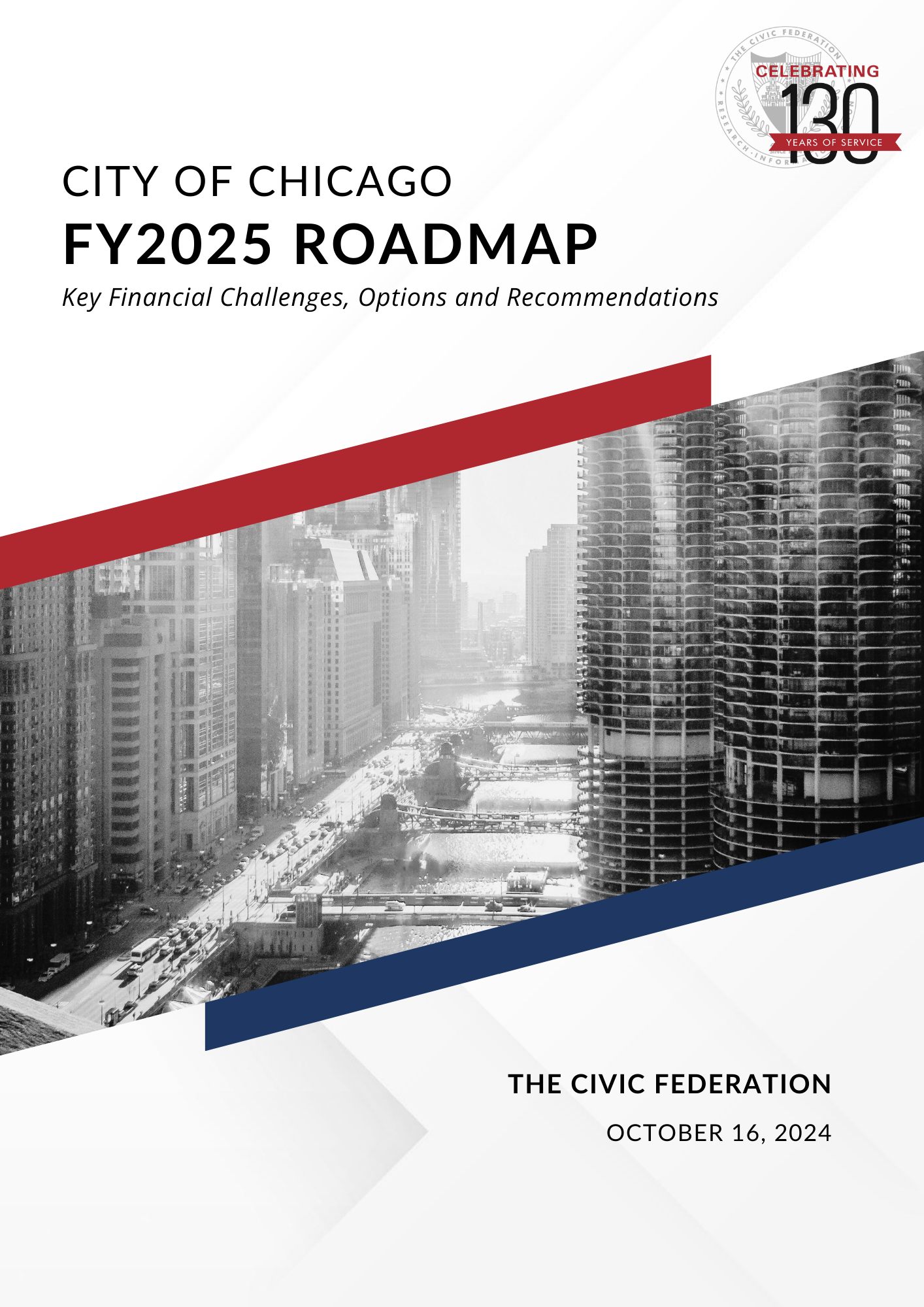October 16, 2024
Click here to read the full report.
Click here to read the executive summary.
Click here to read the press release.
EXECUTIVE SUMMARY
The City of Chicago FY2025 Roadmap outlines the City's urgent financial challenges and provides immediate non-revenue and revenue options for FY2025, along with long-term options and broader recommendations to better position the City in the future.
The City is contending with two merging fiscal hurdles: Fiscal Year 2025 (FY2025) budget planning to address a projected $982.4 million deficit, and a $222.9 million deficit remaining in the current fiscal year. Key obstacles contributing to its massive financial shortfall include the City’s habitual structural deficit budgeting, or overreliance on one-time revenues to support expanding costs and operations it cannot responsibly sustain; its pension payment obligations and long-term debt burden; the lack of clarity around the effectiveness, accountability and total spending of the Chicago Police Department and related public safety functions; the City’s lingering financial entanglements with Chicago Public Schools (CPS); and uncertainty around what the cost of care will look like going forward for the merging migrant/homelessness program challenges in the City.
The Roadmap report offers several potential immediate non-revenue options the City of Chicago should first consider to balance its budget:
- Cut or offset dormant vacancies;
- Institute a mandatory furlough of City personnel;
- Approve a one-time suspension of the City’s supplemental pension payment;
- Explore repurposing ARPA funds for eligible non-recurring expenses in the FY2025 budget;
- Review and Suspend Non-Critical Capital Expenditures; and
- Utilize Tax Increment Financing (TIF) surplus to help balance the budget.
Without specifically endorsing any of the following, the Civic Federation offers the following available options to increase the City’s revenue:
- Reassess and consider increasing the garbage collection fee;
- Legalize video gambling;
- Reduce and recalibrate fire department staffing;
- Increase the liquor tax;
- Implement a local grocery tax through ordinance;
- Implement congestion pricing;
- Bring back the employer’s expense tax (head tax); and
- Implement through home rule an increase in other existing local taxes, such as the rideshare tax, checkout bag tax, motor fuel tax, wheel tax (city sticker tax), restaurant tax, amusement tax, accommodations-relaxed taxes, and property taxes. For a host of reasons detailed in the report, the Civic Federation believes there is substantial question of whether property tax increases are needed and believes regardless that they should be approached as a last and least resort for FY2025.
The report also outlines several additional options to be considered for future long-term planning. These are not short-term fixes, as they would require changes to State statues and would take a significant amount of time to pass and implement. Potential long-term options include; implementing congestion pricing that includes variably-priced lanes and variably-priced tolls on entire roadways; implementing a Chicago income tax; creating a commuter tax for individuals living in one municipality but working in another; establishing a financial transaction tax on the purchase and/or sale of securities; implementing a graduated real estate transfer tax; increasing the City share of the local government redistributive fund; and taxing retirement income.
Finally, the report offers the following recommendations to better position the City to meet future deficits:
- Establish an ordinance-level government efficiency task force that, in addition to producing findings and recommendations to help reduce the projected FY2026 deficit, could recommend specific studies such as a City-County-Sister Agency Collaboration and Efficiency Study;
- Fast-track a working group to resolve legal and fiscal entanglements with Chicago Public Schools;
- Develop a long-term financial plan for City operations and pension funds;
- Improve police budget transparency and accountability, particularly on the Consent Decree;
- Expand the role of, and resources to, the City Council’s Office of Financial Analysis; and
- Increase transparency around migrant care funding and contracting.
Click here to read the full report.
Click here to read the executive summary.
Click here to read the press release.
OTHER RESOURCES
- Civic Federation - Financial Challenges Facing the Chicago Mayor and City Council: Options and Recommendations
- Civic Federation - City of Chicago FY2024 Proposed Budget: Analysis and Recommendations
- Civic Federation - How Much Does the Chicago Police Department Actually Spend Each Year?
- Civic Federation - Estimated Effective Property Tax Rates 2013-2022 Report + Interactive Property Tax Charts
- Shayne C. Kavanaugh and Joseph P. Casey, PhD, “Cash is King: Short-Term Strategies to Slow
- the Flow of Money Out the Door and Keep the Budget Balanced,” Government Finance Officers Association
- Shayne C. Kavanaugh and Gordon Mann, “Balancing the Budget in Bad Times: Part 2 - Riskier Treatments for Reducing Cost and Enhancing Revenues in the Next 12–18 Months,” Government Finance Officers Association

